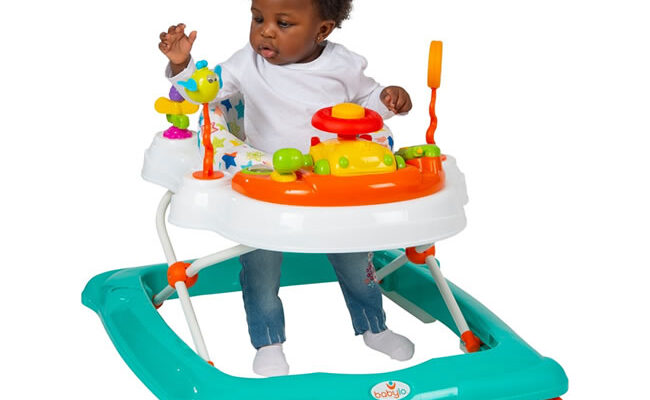
MANY parents love infant walkers because of their baby-tending and entertainment value. It allows babies to scoot around the house before they can walk and crawl. Parents believe that infant walkers can help a baby learn to walk.
Infant walkers are seats hanging from frames that allow a baby to sit upright with the legs dangling and feet touching the floor. They have tray tables in front and wheels on the base. Infants are typically placed in walkers between the ages of 4 and 5 months, and use them until they are about 10 months old. While they’re seated, they can propel themselves around.

Even as new safety features have been implemented over the years, thousands of babies every year end up in hospital after falling down stairs, rolling down a slope or bumping into furniture while in a walker.
Walkers on the market now are required to have some protective gadgets, either a gripping mechanism that keeps the walker from going over the edge of a stairwell or a design that prevents the walker from fitting through a doorway. Older walkers don’t have these safety features.
But even with the extra safety features, experts say baby walkers aren’t safe to use.
“When you have a baby in a walker and a staircase that is unprotected, it is a disaster waiting to happen,” Dr Ajibola Oladiran, a consultant orthopaedic and trauma surgeon at the University College Hospital (UCH), Ibadan, said. “So, if there is a baby in a house, there should be gates at the top and bottom of the staircase or rooms you don’t want the child to go in. The speed at which a child will reach the staircase in a walker is more than when crawling, so the injuries will be worse.”
Dr Oladiran stated that baby walkers are not as safe as many people think and should be used with a lot of precautions in place and with adequate supervision. Walkers make babies taller, so they might be able to pull dangerous objects like hot cups of coffee or pots on countertops on themselves or touch a hot stove. They could also tip and fall over objects.
“The excitement of being able to move in a baby in a walker can overwhelm their ability to understand and respond to words of caution like stop for instance in a child that is less than one year old.”
Many parents believe that infant walkers can help babies learn to walk and hasten the achievement of these critical milestones. However, research shows that babies who use a walker may learn to walk later than those who don’t. Babies learn to walk in part by watching and understanding how their feet and legs move.
“Nature designed that a child will not stand on his own until he has enough strength in the leg muscles and coordination to support his weight, so using the walker removes that ability,” Dr Oladiran added.
Babies need to practice crawling, pulling themselves up, and cruising to learn how to walk – none of which they get to do if they’re in a walker.
Moreover, a researcher at Case Western Reserve University in Cleveland, United States, found that contrary to common parental beliefs, infant walkers are likely to impair an infant’s motor and mental development.
The study tracked the motor and mental skills of 109 infants 6 to 15 months old to determine the developmental effects of spending part of each day in a walker.
On average, infants who did not use walkers sat at 5 months, crawled at 8 months and began to walk in their 10th month, while babies who used walkers that blocked their views of their feet first sat near the end of their 6th month, crawled at 9 months and walked at almost 12 months.
Also, according to the study, babies whose walkers permitted them to see their feet sat and crawled at an age midway between the other two groups. In addition, babies in walkers showed some abnormalities in posture and gait when they first started walking, although these abnormalities soon corrected themselves.
Moreover, there are many problems with baby walkers that the manufacturers and retailers don’t tell you about.
“We discourage its use because it can lead to baby neglect. They believe that they had kept the baby in the walker and he is safe while they will be doing other things. But the baby may push the walker away, engaging in other things, pick things up and put in the mouth and so on without the mother knowing,” added Dr Olubukola Salam, a consultant family physician at the UCH, Ibadan.
Dr Salam stated that rather than keeping babies in walkers all the time to keep them busy playing with toys, mothers should rather hold their babies to build a better child-mother relationship.
“It is unlike carrying or holding the baby to try to walk. It improves bonding, unlike leaving the child in the walker most of the time. Also, studies have shown that the walking pattern of babies with awkward foot placement/bow-legged worsen with the use of walkers, especially if they are already walking abnormally,” she declared.
So, while baby walkers are popular and many families use them without any problems, some risks make them bad for the baby’s health. So, they are better used sparingly.
READ FROM ALSO NIGERIAN TRIBUNE







